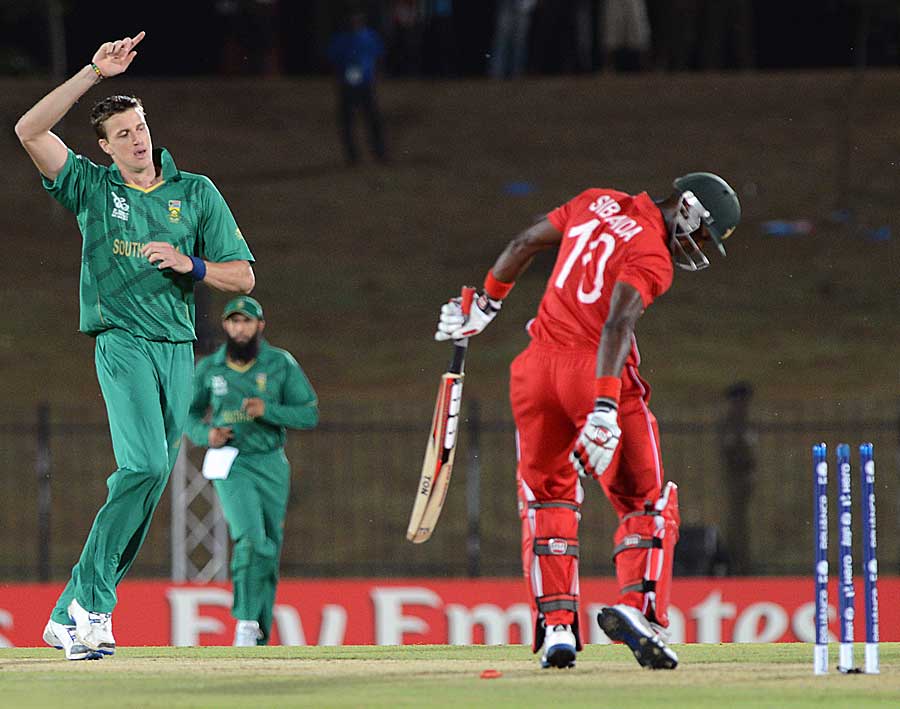
If South Africa were hoping to ease their way into the tournament, they couldn't have wished for a better surface to open their campaign on than the pitch they encountered on Thursday night in Hambantota. The South Africa seamers might have started paying attention when Dale Steyn's first delivery zipped off the surface and carried well to the keeper, but when Morne Morkel bowled Vusi Sibanda with a vicious indipper, they would have known they would enjoy the evening. Eight wickets for 66 between the four of them, all 16 overs bowled, should have them well satisfied.
But that is partly why this 10-wicket victory means little in the context of the competition. It would be easy to dress it up as a dire warning to the other teams. Of the four wins over minnows so far, this was, after all, the most resounding. South Africa made no major errors in any department; they were ruthless with ball in hand and clinical in their run chase. Still, given the conditions, the result seems a little hollow.
South Africa are now guaranteed a place in the Super Eights, but all of their games in that phase are in Colombo - traditionally the least juicy pitch of the three being used for the World Twenty20. The Premadasa wicket had bounce and carry on its first evening of use, but given the venue will host 16 more matches in the next few weeks, including the women's knockout matches, the square is unlikely to retain that spice for the duration of the tournament. South Africa didn't bowl out either of their spinners against Zimbabwe, but if they are to go deep into the tournament, Robin Peterson and Johan Botha will likely have to play a bigger role.
"It wasn't a typical subcontinent wicket. There was a bit of pace and bounce and quite a bit of seam movement up front with the new ball," Richard Levi said following the match, with AB de Villiers echoing his surprise at the conditions.
It didn't help that Zimbabwe were abysmal either. In captain Brendan Taylor's own words they "were sloppy in the field, leaked runs with the ball and didn't score many runs with the bat". South Africa assessed the conditions well and bullied Zimbabwe into timidity with bursts of short bowling punctuated by mettle-testing fuller deliveries, but they can hardly expect better teams to simply miss unremarkable straight balls, like Elton Chigumbura did in Jacques Kallis' first over. It might appear from their first win that South Africa have no weaknesses, but Zimbabwe were woefully equipped to test them in any department.
To compound matters for both South Africa and Sri Lanka, their match on Saturday now becomes a dead rubber. Both sides will talk up the match as opportunity to gain momentum and build confidence ahead of the Super Eights, but with essentially nothing riding on the encounter, there is little incentive to lift performance, nor can the players prepare themselves for the big-game pressure that is to come. The teams will also be tempted to experiment with new combinations. If the strongest XI doesn't take the field, they have a ready-made excuse for losing, and neither team will take much away from the match.
There is, however, little South Africa could have done better on Thursday. Though the spinners didn't feature, the fast men are humming nicely and have proved they haven't lost their venom on the plane trip from England. Levi too, will be glad of the time in the middle, given the questions over his technique. Zimbabwe's bowling was almost as lackadaisical as their batting, but sometimes an easy opposition can help a batsman play himself into form.
"If there's a bit of liveliness in the pitch, with that sort of South African bowling attack, they're going to be very hard to beat," Taylor said. "Their batsmen are world class too. I see both them and Sri Lanka getting to the semi-finals at least."
If the Premadasa does provide fast surfaces early in the Super Eights, South Africa's attack will make them formidable. But as the tournament progresses, the better teams will ask much tougher questions than Zimbabwe did, and if the pitches change, interrogations will be in a different language as well.





Comments
Add new comment